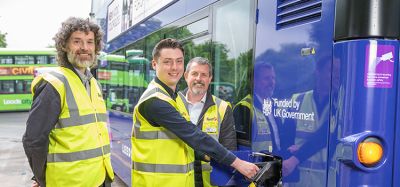Passengers urged to make better use of the first and last miles of journeys
- Like
- Digg
- Del
- Tumblr
- VKontakte
- Buffer
- Love This
- Odnoklassniki
- Meneame
- Blogger
- Amazon
- Yahoo Mail
- Gmail
- AOL
- Newsvine
- HackerNews
- Evernote
- MySpace
- Mail.ru
- Viadeo
- Line
- Comments
- Yummly
- SMS
- Viber
- Telegram
- Subscribe
- Skype
- Facebook Messenger
- Kakao
- LiveJournal
- Yammer
- Edgar
- Fintel
- Mix
- Instapaper
- Copy Link
Posted: 9 January 2019 | Intelligent Transport | No comments yet
Go-Ahead is urging people to start 2019 with healthy intentions; making walking, cycling or running part of their everyday commute.


In partnership with RunFriendly and the University of Leeds, Go-Ahead has published a study examining the health benefits of active travel combined with public transport, offering an alternative to driving for all or part of daily commutes.
This new study suggests that the time and money-saving opportunities of being active in daily commutes are compelling. Given the habitual patterns of commuting, small changes can help in finding – and then sticking with – more positive, healthy everyday behaviours.
The World Health Organisation recommends that all adults either spend 30 minutes on a brisk walk or cycle, five days per week, but a third of UK adults don’t meet this.
People who travel by public transport on average accumulate 20-28 minutes of physical activity as part of their regular journey. Go-Ahead’s activity suggests that the WHO’s minimum standard of exercise could be achieved for millions of people simply through re-thinking their journey to and from work – either walking, running or cycling to or from a station.
The benefits of active travel for the first or last mile of a public transport journey include a reduced risk of heart disease, cancer or strokes. A 10-minute brisk walk, such as walking to the bus stop, can increase mental alertness, energy and mood, while people who participate in daily physical activity also have approximately a 20-30 per cent lower risk of depression and dementia.
Katy Taylor, Go-Ahead’s Commercial and Customer Experience Director, said: “It’s a challenge, in a busy life, to find the time for exercise. The first and last mile of a daily commute are an often overlooked opportunity.
“Heart disease and obesity are public health crises in this country. So, too, is air quality, which is worsened by traffic congestion. A small change in behaviour every day can deliver very substantial benefits over the course of a year.”
Go-Ahead and RunFriendly’s research found that 54 per cent of walkers, 36 per cent of cyclists and 39 per cent of runners say that their journey gives them time and space to think about their day, and a majority of commuters using active modes of transport agreed that their first or last miles were relaxing and enjoyable.
Furthermore, 28 per cent of drivers agreed that active travel would be feasible as part of their commute, reflecting the opportunity for further change.
RunFriendly Chief Executive, Scott Cain, said: “Our research with Go-Ahead gives evidence of what works. Being active in how we begin and end our daily commute – for example running or cycling to or from the station or from the station to work – can often save time rather than eating into it. That’s one of the reasons our research shows 66 per cent of people would value the opportunity to do exercise as part of their commute.”
Related topics
Air Quality, Alternative Power, Multimodality
Related cities
United Kingdom
Related organisations
Go-Ahead Group, RunFriendly, University of Leeds
Related people
Katy Taylor, Scott Cain







